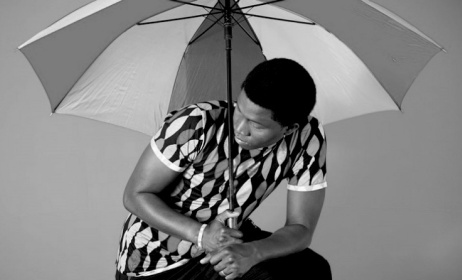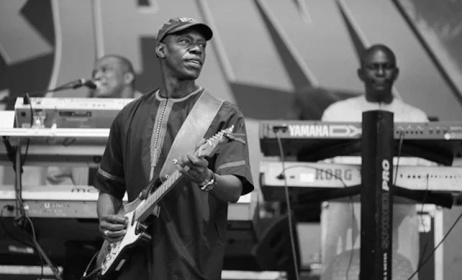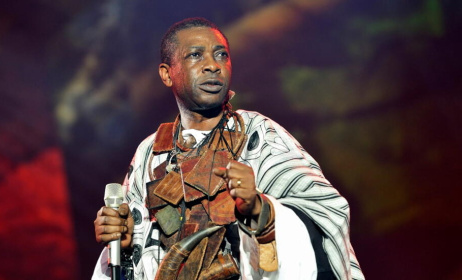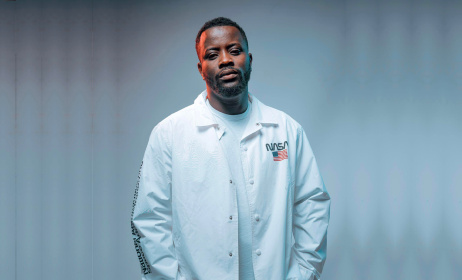One decade on, remembering SA’s Jabu Khanyile
Tomorrow, Saturday, 12 November marks ten years since South African musician and lead vocalist Jabu Khanyile passed on.
 The late Jabu Khanyile. Photo. YouTube
The late Jabu Khanyile. Photo. YouTube
The legendary jazz maestro died at his home in November 2006 after battling with diabetes and prostate cancer. According to reports, when Khanyile died, he was working on a new album that was bent on creating awareness about cancer.
Khanyile, who was also a songwriter, spent most of his career struggling to get a stable band.
Born on 28 February 1957 in Mafolo, Soweto, Khanyile was lead member of Bayete band, an Afro-jazz ensemble where he was a drummer. The band was founded in the 1980s and became one of South Africa’s most visible touring groups in the 1990s.
Jabu was raised in a musical family, his father was a miner and often performed traditional a capella songs. John his brother was a member of a reggae and soul covers band. Following the death of his mother, Jabu dropped out of school to pursue a career in music to earn a steady living. A young Jabu, at 14, joined a local band called The Daffodils in the early 1970s. In 1974, he left the group and joined his brother at The Editions band as a drummer and rose to become a vocalist. Jabu’s career was slowly growing, John saw potential in Jabu and bought him a guitar which he quickly learnt and earned himself some money by playing in open places.
Jabu left The Editions and joined The Movers. Spotting success in his career, The Editions manager encouraged him to reform the group. Jabu jumped up to the idea, he revamped The Editions with young members and released a single titled ‘Izinyembezi’. The group did not live up to his expectations and Jabu found himself looking for another band.
A talented Jabu later joined The Movers and released a hit single called 'Inhlonipho' which earned them fame. Unfortunately, power struggles emerged within the group and once more, Jabu left The Movers but never gave up his dreams of becoming a great artist. His endurance paid, a new eight member group called Bayete was looking for a drummer. Auditions were done and Jabu joined the team as a drummer for ten years. Khanyile later became a lead vocalist and co-composer of the band's songs. In 1993, Bayete disbanded and Jabu decided to pursue a solo career.
With Jabu as a member of Bayete, the outfit released a series of songs such as 'Mbombela', 'Hareyeng Haye' and 'Mbube'. Bayete shot to stardom with the release of a great album titled Mmalo-We. The album featured songs such as ‘Mmalo-We’, ‘Thabo’ and ‘Retrenchment’. The album caused waves on local radio stations and even spread to other African regions but mostly ‘Mmalo-We’ became a darling of many music lovers.
Jabu, a then matured and experienced musician, did not take long to put his house in order. He teamed up once again with his production team namely Thapelo Kgomo and Ian Osrin. Together with his team, Jabu spent half a year nurturing new lyrics with the idea of encompassing different traditions and cultures in his music.
Mmalo-We certified gold and won various South African Music Awards (SAMAs). In 1994, Jabu was honoured Best Male Performer of The Year, Best Song of The Year (Mmalo-We), and Jabu’s producer Thapelo Kgomo won Best Producer. The album also won the Kora Awards in the Best Artist or Group from Southern Africa category. In 2000, Bayete won the Best Group award at the SAMAs.
Khanyile gained international fame in 1996 after an appearance at the Royal Gala evening in honour of the late statesman Nelson Mandela. He also earned collaborations with big artists, chief among them a support-act role to Salif Keita's Johannesburg concerts. He has performed Youssou N'Dour, Angelique Kidjo and the late Papa Wemba.
Famed for his pan-Africanist approach to music, Khanyile’s last performance was in July 2006 at the World Cup handover ceremony in Berlin, Germany. Up to the time of his death, Jabu had released a eight albums.



























Commentaires
s'identifier or register to post comments